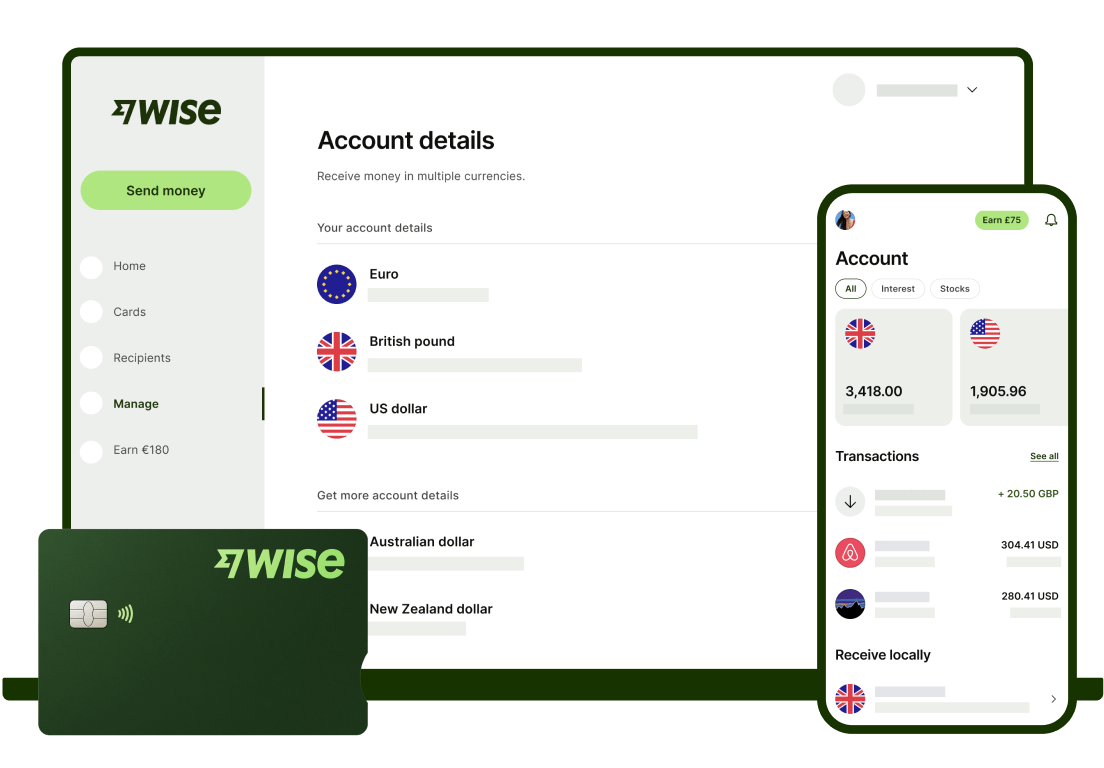Austria corporate tax - guide for international expansion
Learn about the corporate tax system in Austria, its current rates, how to pay your dues and stay compliant, and best practices.

Do you want to open a business in the UK? If you have an ambitious business plan and want to get your ideas off the ground you might be wondering how to start a company in the UK, and what your options are.
This guide walks through business structure types you may consider, how to start a small business in the UK, and why a UK business can be a profitable prospect. Plus we’ll introduce Wise Business as a great option to manage your UK company finances across multiple currencies, with the mid-market exchange rate and low fees1.
If you're a business sending more than 100,000 GBP (or equivalent) monthly across different currencies, get in touch with the Wise Business sales team to discuss the best solutions for your needs.
Talk with Wise Business Sales Team 🚀
Before we look at how to set up a business in the UK, let’s look at why you might want to, and what type of business may work well in the UK business landscape.
Depending on how you measure it, the UK is one of the largest economies in the world, and an aspirational place for many people to launch a business. The UK economy is dominated by service industries and public services, with specific sectors like manufacturing, construction and agriculture also playing a large part.
Some key sectors in the UK economy include2:
- Real estate (12.5% of the market)
- Retail (10.4%)
- Manufacturing (9.4%)
- Finance (9%)
The UK is also known to be a nation of small business owners, with many small independent companies contributing enormously to the overall economic success of the country - this has, in turn, meant that processes to set up a business are streamlined and simple to access, to allow more small businesses to base themselves here in future.
There are different types of legal entities you can choose to set up in the UK. Which suits your specific needs will depend on the type of work you do, and your future plans. Your key options include:
- Sole trader (self employed)
- Partnership
- Limited liability partnership
- Limited liability company
Let’s take these options one by one and look at them in a little more detail.
A sole trader3, is the simplest business entity option in the UK. As a sole trader, your personal finances are not separate from your business finances. While that means that registering is super easy - just inform HMRC you’ll pay tax by self assessment - it also means that you take a personal risk if your business runs into financial problems, as you’re liable for any costs.
In a simple UK partnership4, you’ll partner with one or more people (or entities, like limited companies), to take joint responsibility for running your business. This means that each partner is liable for their own share of any company losses, and also entitled to their own share of profits. Partners must manage their own tax affairs.
As with a simple business partnership, an LLP5 in the UK can be set up with 2 or more individuals or entities. Each partner will still be entitled to their share of company profits, and will manage their own taxes - but their liabilities are limited. This means that if the company runs into difficulties, partners are financially protected as the LLP is seen as an entity that sits separately to its owners.
Private limited companies6 can be limited either by shares or by guarantee. Profit making businesses are usually limited by shares. An Ltd company is legally separate to the owner and directors. That means that the business finances are separate from your personal finances, so you’re not personally liable if your company runs into financial difficulties. If you have a limited company, which is limited by shares, you can keep or reinvest any profits after tax.
How you need to proceed to set up your UK business depends on the entity type you pick.
If you’re registering as a sole trader you’ll just need to confirm with HMRC that you’ll start to pay your tax by self assessment.
Simple business partnerships effectively means that you’re running a business as an individual but share responsibility for the business with all the named partners. To get started - as with being a sole trader - you must register with the tax authorities as self-employed. You can then run the business while being taxed as an individual, with an agreement made among the partners about profit sharing.
The process to set up a limited company in the UK requires a little more time. You need to8:
When you register your business you’ll need to provide a suite of paperwork, which can vary a bit depending on the entity type you decide to set up. The documents you'll be asked to provide can include:
If you intend to have a limited liability company, you’ll need to register (incorporate) it. Registering your UK company with Companies House can be done online and usually takes only 24 hours. If you register online it costs only £12. Alternatively, there are postal registration routes (at an increased fee), and options to have a third party agent support your registration9.
Let's walk through the answers to some commonly asked questions about opening a UK business - you can also find out more in our full guide to incorporate a UK company.
You can usually start a business in the UK as long as you have the following7:
- a unique company name
- a UK company address
- at least one director - does not need to be a UK resident
- at least one shareholder - an individual or another company
If you’re not sure if you can start a business in the UK, you can also get help from a whole range of professional support services which can advise based on specific individual circumstances.
There’s lots of helpful advice from the UK government, on the Department for Business and Trade website, which includes resources to find help for setting up your UK business.
Alternatively you can get professional support from a company formation agent, which can make the entire end to end process smooth and easy to navigate.
To open a business bank account in the UK you’ll usually need a suite of paperwork, ID and address verification documents for the business owner, directors and anyone who has significant control over the company, as well as any required opening deposit amount. Some banks let you open an account online, but it’s pretty common to need to visit a branch to get verified.
Usually the steps you’ll need to take to open a business account with a bank include:
As an alternative you may prefer a simple account you can open online or in-app from Wise Business. Getting your account set up is straightforward and can be done by uploading clear images of all the required paperwork. Plus, Wise Business accounts have loads of powerful international features and smart ways to save time and money. We’ll look at Wise Business and how to open an account, in a moment.
Get started with Wise Business 🚀
The costs of opening a UK business can vary depending on how you choose to get started - but it’s usually pretty low, making getting your business incorporated an easy task. Here’s what you may pay to incorporate your UK business9:
Don’t forget, other unavoidable costs may also apply, such as professional indemnity insurance, which can be in the range of £300 - £400 per year for £1 million or more coverage.
| Check our guide to the costs of incorporating a company in the UK |
|---|
Manage your company’s finances across borders, with flexible, low cost multi-currency accounts from Wise Business.

Wise Business accounts let you hold and exchange 40+ currencies with the mid-market exchange rate and low fees from 0.43%1. You’ll be able to send money to 160+ countries globally to pay suppliers, contractors and staff - and you’ll get local bank details for a selection of major currencies to get paid by customers or through PSPs like Stripe and marketplaces like Amazon.
As well as all this, Wise offers business friendly features like linked debit and expense cards, multi-user access, batch payment tools and cloud accounting integrations. Here’s how to register a Wise Business account in just a few simple steps:
Get started with Wise Business 🚀
Opening a UK business is fairly straightforward, and the barrier to entry is low, with business incorporation available in 24 hours, from just a few pounds. Use this guide to decide which business type might suit your needs - and no matter which you choose, check out Wise Business as a smart solution to handle your business finances now and as your company scales.
Sources used in this article:
Sources last checked Dec 20, 2023
Disclaimer: The UK Wise Business pricing structure is changing with effect from 26/11/2025 date. Receiving money, direct debits and getting paid features are not available with the Essential Plan which you can open for free. Pay a one-time set up fee of £50 to unlock Advanced features including account details to receive payments in 22+ currencies or 8+ currencies for non-swift payments. You’ll also get access to our invoice generating tool, payment links, QuickPay QR codes and the ability to set up direct debits all within one account. Please check our website for the latest pricing information.
*Please see terms of use and product availability for your region or visit Wise fees and pricing for the most up to date pricing and fee information.
This publication is provided for general information purposes and does not constitute legal, tax or other professional advice from Wise Payments Limited or its subsidiaries and its affiliates, and it is not intended as a substitute for obtaining advice from a financial advisor or any other professional.
We make no representations, warranties or guarantees, whether expressed or implied, that the content in the publication is accurate, complete or up to date.

Learn about the corporate tax system in Austria, its current rates, how to pay your dues and stay compliant, and best practices.

Learn about the corporate tax system in Botswana, its current rates, how to pay your dues and stay compliant, and best practices.

Learn about the corporate tax system in Chile, its current rates, how to pay your dues and stay compliant, and best practices.

Learn about the corporate tax system in Montenegro, its current rates, how to pay your dues and stay compliant, and best practices.

Learn about the corporate tax system in Monaco, its current rates, how to pay your dues and stay compliant, and best practices

Learn about the corporate tax system in Costa Rica, its current rates, how to pay your dues and stay compliant, and best practices.